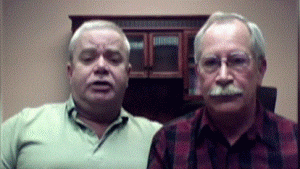
(CNN) — Gene Barfield and his partner, Tim LaCroix, celebrated their 30th anniversary by getting married.
The two met when they were both serving in the Navy, and last week, the military veterans became the first same-sex couple to be legally married by a tribe in Michigan.
The pair exchanged vows on a cold but sunny morning at the government headquarters of the Little Traverse Bay Bands of Odawa Indians.
LaCroix is a citizen of the LTBB, a federally recognized Native American tribe.
Earlier this month, the LTBB tribal council voted to recognize same-sex unions as long as at least one member of the couple was a citizen of the tribe. LaCroix and Barfield were married the same morning that the tribal chairman signed the legislation into law.
“Gene had a heart attack last year, so we’re aware that we need to do this now. We have less years in front of us than we do behind us,” said LaCroix.
“Plus I just want to marry him. I love him,” he added.
The couple lives in Boyne City, Michigan, on a 30-acre farm that has been in LaCroix’s family for generations.
“We didn’t want to go to another state to get married. We always wanted to have the wedding here in the state of Michigan. It’s our home,” LaCroix said.
The state of Michigan, however, says it will not recognize their marriage.
“The Michigan Constitution defines marriage as a union between one man and one woman. Same-sex marriages performed in other states, countries, or in sovereign tribal nations are not valid in the state of Michigan,” said Joy Yearout, spokeswoman for Michigan Attorney General Bill Schuette.
Under U.S. policy, Native American tribes like the LTBB are self-governing and therefore able to make and enforce their own laws — including ones governing marriage of tribal citizens.
In 2004, Michigan approved a constitutional amendment legally defining marriage as being between a man and a woman. Thirty-seven other states have laws or amendments similarly defining marriage, according to the National Conference of State Legislatures.
Barfield and LaCroix say they are optimistic the tide is shifting in favor of same-sex marriage.
“Marriage was inconceivable for me for such a long time, but now that has changed,” Barfield said.
Last year, for the first time, voters in several states approved same-sex marriage statewide at the ballot box. Similar measures had been rejected for years. Same-sex couples became free to marry in Maryland, Maine and Washington. Gay rights supporters also scored a smaller victory in Minnesota, where voters rejected a constitutional amendment to ban gay marriage. Before 2012, six states had already legalized gay marriage — but via courts and legislatures, not voters.
More Americans favor same-sex marriage than oppose it, according to a recent Pew Research Center poll.
The LTBB is the third tribe to recognize same-sex marriages, after the Coquille Tribe of Oregon and the Suquamish Tribe of Washington.
Getting married is not the end of the journey for LaCroix and Barfield. They would like their marriage and those of other gays and lesbians to be legally accepted in every state.
The biggest hurdle the couple faces is the federal Defense of Marriage Act, known as DOMA. The 1996 law allows states to ignore the marriage laws of other states and it specifically exempts states from being forced to accept tribal same-sex marriages. The Supreme Court is expected to rule on a legal challenge to DOMA this term.
Barfield and LaCroix hope their union will be part of the ongoing legal and personal discussions about marriage rights for gays and lesbians.
Barfield asks people to keep an open mind.
“We served our country to uphold those people’s rights to protest our right to get married,” he said. “If you’re good enough to bear arms for your country or to die in some lonely valley in Afghanistan, you’re good enough to come home and get married.”
Barfield and LaCroix said they are thrilled to finally be able to express their love in marriage, and they are mindful that their simple ceremony could hold meaning for other gays and lesbians.
“After waiting 30 years, we had patience and it finally happened. And you want to help people who are also in that struggle,” LaCroix said.











